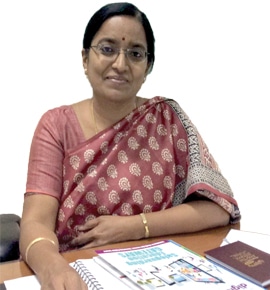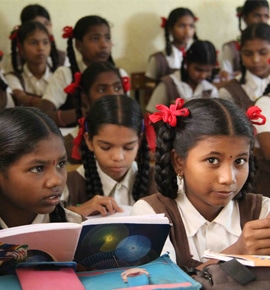
To reduce the drop-out ratio at the primary and secondary level, Andhra Pradesh State Government has been making all efforts to improve basic amenities in public schools. Sandhya Rani, State Project Director, Andhra Pradesh, talks to Sudheer Goutham of Elets News Network (ENN) about the online monitoring system to be put up by the AP Government for the Education Mangers across the State to monitor all key education indicators

How is the compliance of private schools to RTE Act in Andhra Pradesh. What is the progress in the implementation of RTE Act. Can you give numbers?
With regard to the provision of allocating 25 per cent seats in private schools to students from poor and economically weaker sections, Govt.Order.Ms.No.42, School Education, dated 30.07.2010 indicates the fee reimbursable and other conditions. This G.O is challenged in legal courts and further implementation is constrained by the same. Meanwhile, Government of Andhra Pradesh constituted a Committee for recommending fee reimbursable to private schools with regard to 25 per cent seats. The recommendations of the Committee are under examination by the Government.
What are the trends of school drop-outs ever since the RTE Act was introduced in 2009?
Drop-out rates at elementary and secondary stages of education have been declining. However, there is a need for greater progress. The low Net Enrolment Ratio (NER) at the upper primary level and the increasing enrolment gap from elementary to secondary level suggests that although a larger number of children are entering the educational system, a significant proportion of them are not progressing through the system to complete elementary/secondary cycle of education. Drop-out rates among disadvantaged groups, especially for girls from these groups, remain higher than the national average.
AP State Government is in the process of putting in place an online monitoring system for the Education Mangers across the State and monitor all key education indicators – enrolment, drop-out, transition, etc. As part of the focused measures to improve retention in schools of girl children from socially and economically disadvantaged communities, 352 Kasturba Gandhi Balika Vidyalayas (KGBVs) are set up in the Educationally Backward Mandals/ Blocks (low female literacy Mandals) to provide residential schools for drop out girls from VI to X Class. About 68,000 girl students are currently pursuing their education in the KGBVs. During the current year, the Government has introduced the English medium education for the KGBV Girl students for their continuity/ retention in the schools.
Keeping in line with the objective of RTE Act, 2009, AP Sarva Shiksha Abhiyan (SSA) ensures access to all the out of school children, i.e., children never enrolled, children dropped out and for urban deprived children like street children, orphans, rag pickers, children of broken family and children of Sex workers, etc. Quality education is provided through special training centers run under the supervision of regular schools and to track the children enrolled in special training till mainstreaming and thereafter in the school.
Drop-out Rates From 2009-10 To 2014-15- ALL (Recognised Schools)
| Sr. No. | Year | Primary Level(I-V) | Elementary | Level (I-VII/VIII) | Secondary Level (1-X) | |||||
| Boys | Girls | Total | Boys | Girls | Total | Boys | Girls | Total | ||
| 1 | 2009-10 | 9.27 | 8.58 | 8.93 | 20.69 | 21.38 | 21.03 | 49.31 | 51.08 | 50.18 |
| 2 | 2010-11 | 10.56 | 9.33 | 9.95 | 15.35 | 15.99 | 15.66 | 42.95 | 45.44 | 44.19 |
| 3 | 2011-12 | 7.51 | 7.40 | 7.45 | 14.94 | 14.96 | 14.95 | 41.23 | 42.75 | 41.98 |
| 4 | 2012-13 | 5.83 | 6.34 | 6.08 | 20.33 | 20.42 | 20.38 | 32.84 | 34.00 | 33.41 |
| 5 | 2013-14 | 3.16 | 3.25 | 3.20 | 19.37 | 18.95 | 19.16 | 26.20 | 27.48 | 26.83 |
| 6 | 2014-15 | 4.88 | 4.30 | 4.60 | 14.91 | 16.59 | 15.74 | 24.54 | 25.93 | 25.23 |
Note: Dropout Rate at Elementary level for the years 2012-13 and 2013-14 is calculated for classes I- VIII
Lack of basic amenities in public schools including toilets, running water and other infrastructure, many girl students avoid coming to schools or miss classes. The situation continuous to be poor.
The Government of Andhra Pradesh has been making all out effort to improve basic amenities in public schools including toilets, running water and furniture, etc. Under the Swatcch Vidyalaya programme in all schools, one girls toilet and one boys toilet are provided. During the current year, in partnership with Government of India, Public Sector undertaking and Corporates, over 18,000 toilets were constructed/repaired in the State. Of the 47,000 schools, in 3000 (15.67 per cent) schools there is no running water. Alternative arrangements by way of supply through tankers are made by the District Collectors, through local Panchayat & Rural Water & Sanitation Department.
 What initiatives are being taken by the State Government to improve literacy in the State?
What initiatives are being taken by the State Government to improve literacy in the State?
Various initiatives are taken up for improving literacy in the State, especially of the school age going children –“Badi Piluthondi”(School is calling) campaigns to ensure 100 per cent enrolment of school age going children, provision of infrastructure, school uniforms, text books, Mid-Day meals, etc. Prathibha Awards (Merit Awards) awarded to the meritorious students who excel in the SSC Public Examination with a merit certificate, Memento and a scholarship amount of `20,000 for pursuing Higher Education.
The School Management Committees (SMCs) are in place in all the schools. SMCs provide a platform for parental motivation, participation in the school developmental activities, and directly or indirectly help in sustaining the enrolment and improvement of literacy.
Andhra Pradesh State has achieved significant progress in the last decade with regard to improving the levels of adult literacy among its population. Literacy levels have gone up from 60.47 per cent to 67.41 per cent during this period. However, this is still lower than the National average of 72.98 per cent. Under the Sakshara Bharat programme, Adult Education Centers (AECs) are set up at the Gram Panchayat level to provide institutional, managerial and resource support to literacy and lifelong education at grass root level. The AECs hold literacy classes for non-literates and semi-literate persons, conduct Skill Development Programmes, run libraries and reading rooms, etc.




















